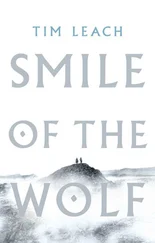Zanticus grunted. ‘See that you do.’ And he strode away, his bodyguards flocking behind him.
Gaevani lingered behind a moment longer, and for a moment the mocking smile seemed to slip from his lips. ‘You had best get him speaking tomorrow,’ he said. ‘Zanticus will not be patient.’
‘Perhaps,’ said Kai. ‘I will think on it. Now get out of here.’ And one by one, they all wandered away, until Kai was alone.
Everywhere, the fires flickered out, the great bonfire at the heart of the camp gone to embers entirely, the seething pile like a sleeping dragon. And at every shadow that passed the fire, every set of footfalls, his eyes danced up to see who it was that approached. He saw lovers wandering back towards their tents, their arms draped about one another. A weeping mother passed by, a trace of white paint on her cheek, marked there by a last embrace.
He thought to remain there all night, a watchful sentry. But again a keening rose from the tented wagon – not the sound of mourning, the greeting to the dead, but a cry of loss, of the broken. He could not tell if it was Bahadur or his wife, or both. Even when he was kneeling upon the ground, hands to his ears like a child, the sound would not stop.
Running once more, his bowed horseman’s knees aching in pain, tripping and stumbling in the darkness until he found the place where the children slept. They were gathered together around their own little fire, nothing but embers now, wrapped in each other’s arms. All asleep it seemed, save for one – the Roman, bound to the wheels of the cart, once more guarded by children, shivering away from the embers.
The knife was in Kai’s hand before he knew it, as he walked towards the bound man. And the words seemed to fall from his lips of their own accord – softly spoken, for he did not wish to wake the children. ‘I have heard it said that you Romans think of yourselves as one people. That an insult to one is an insult to all. An injury to one is an injury to all. Is it so?’
Lucius nodded. ‘It is so.’
‘If I were to hurt you, it would be to hurt Rome?’
‘It would.’
‘I would like that very much.’
The Roman did not speak – no scratching at the ground with his feet, no worrying at the knotted leather thongs with his teeth, no screaming for help that would not come. He remained quite still, and his eyes alone made a proud answer.
‘You shall not beg?’ said Kai.
‘No.’
‘Never?’
A pause. ‘Never for myself.’
‘Yes. That is as it should be.’
Kai leaned down – even then, when he had almost decided, he was still testing with the quickness of the blade. Perhaps he would have cut that throat if the Roman had flinched or screamed. But instead, the only sound the sharp parting of leather as the bindings fell away.
‘Come closer to the fire,’ he said. ‘Warm enough there, but cold back here.’
Kai did not wait to see what the Roman would do. He picked his way through that rough carpet of sleeping children, until he found a place beside his daughter. He sat down then, one hand upon his sleeping child. He placed the other across his knees and leaned against it, and let the tears come at last.
A moment later, a touch and a weight. A hand upon his shoulder, and with his head down, Kai could pretend it was one of the children who held him close in the darkness.
*
It was worse to see Bahadur in the daylight.
In the darkness, Kai’s mind had played tricks, shown him what he wanted to see, like a child painting from memory. But there was no hiding the truth of things under the spring light.
The marks of the body were bad enough – the dry, sallow skin, the birdlike bones almost exposed beneath the flesh. Worse was the blankness of the eyes, the way Bahadur would keep pausing during a simple movement. The hand that wandered to a wine cup would stop part of the way there as though he had forgotten what it was he was supposed to be doing, or a hand would scratch ceaselessly at the scalp until it drew blood.
They sat together cross-legged upon the ground, a woven rug laid beneath them – the charred and half-burned one that Kai had taken from their village. And on it were placed the gifts that Kai’s warband had brought like offerings to a king. Clay jars of honey and bowls of blood, scraps of meat and skins of wine. Bahadur ate and drank like one discovering food for the first time, while Kai, Arite, and Lucius waited in silence for him to speak. For that was all Bahadur had said that morning, once he had learned they had a prisoner amongst them. That he wanted the Roman there.
At last, it seemed, Bahadur could eat no more. He closed his eyes, and let the spring sun wash over him. And with his eyes still shut, he said: ‘Those white-faced riders. The ones from many different clans, who brought these gifts. Why do they answer to you?’
‘I led them here. After the battle on the ice.’
‘You were a captain?’
‘Of sorts, for a time. No longer. They honour me still, though I have not earned the right.’
‘For that I am glad. That I lived to know that you earned a captain’s mark.’
Bahadur fell silent, and did not speak for a long time. Once more the forgetful motions, his finger tracing the rich patterns of the rug beneath them, the drawings of monsters killing horses, men killing monsters. Hunters and hunted, the path of life and death and rebirth. The story of their people, told over and over again.
And when he spoke again, it was not to his wife, nor to Kai. It was to the Roman.
‘Have you ever been close to your Emperor?’ said Bahadur. ‘Talked to him, as we are talking now?’
‘No,’ Lucius answered. ‘I saw him, once. But I never had the honour of speaking to him.’
‘Honour, is it?’ Bahadur shivered once. ‘Perhaps for you. I wish that I had died, rather than be honoured in that way. To know what I know now.’
‘You spoke with him?’ said Kai.
‘Yes. Many times. Though not as men speak with men. It was as if… as if I were some dog of his.’
Arite said: ‘It is a message that you bring from him?’
‘It is,’ said Bahadur. ‘I thought of all the ways that I might say it, when I came here. I thought that I knew, but now…’ The words trailed away.
‘They mean to make the peace cost us,’ said Kai. ‘We all know that. You—’
‘You do not know what Rome is!’ And Bahadur was shouting then, the words ringing like the sound of sword against shield. ‘You think he is some angry chieftain come to make war with you,’ he said, ‘from some border tribe stirred up by a bloodfeud? You think to give them tribute and offer an honourable peace between worthy warriors?’
Arite reached out to him, a tentative hand on his, and he snatched it away as though he had been burned. ‘Do not touch me,’ he said. ‘Do not paw at me as though I am a sick child.’
‘Tell us, then,’ said Kai. ‘What message do you bring?’
‘There are no terms but these. That we submit to him and make ourselves his slaves, give them rulership over our lands and our people. Or they will destroy us all.’
Silence, then. Only the sounds of the camp – from somewhere close, the laughter of a playing child, the hiss of a cooking fire, the sharp whispers of an argument between lovers. What a thing it was, to know the ending of the world before any others. To see the rest of one’s people go about the day unknowing, when nothing that they did mattered any more.
‘You might as well have said that they meant to reach out and stop the sun in the sky,’ said Kai. ‘They cannot do it.’
‘They can. They think us wild children, playing with sticks. Or starving wolves that harass their sheep. You would kill those wolves any way that you could, would you not? Track them to their caves and strangle the puppies, and you would think it a good day’s work. And so it is with them, and us.’
Читать дальше
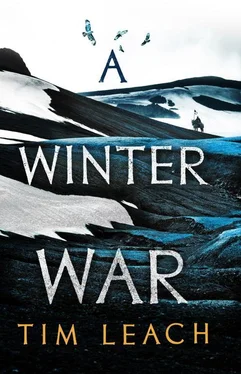
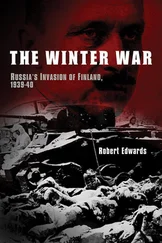

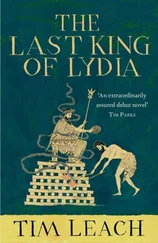

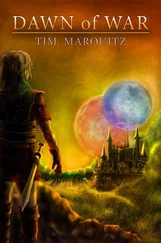

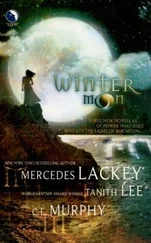
![Стюарт Слейд - Воины зимы [Winter Warriors ru]](/books/401383/styuart-slejd-voiny-zimy-winter-warriors-ru-thumb.webp)
